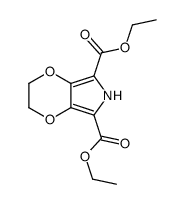870704-19-1
| 中文名 | 3,4-乙烯基二氧基吡咯-2,5-二羧酸二乙酯 |
|---|---|
| 英文名 | diethyl 3,6-dihydro-2H-[1,4]dioxino[2,3-c]pyrrole-5,7-dicarboxylate |
| 英文别名 | Diethyl-3,4-ethylenedioxypyrrole-2,5-dicarboxylate |
| 熔点 | 124-128ºC(lit.) |
|---|---|
| 分子式 | C12H15NO6 |
| 分子量 | 269.25100 |
| 精确质量 | 269.09000 |
| PSA | 86.85000 |
| LogP | 1.13930 |
|
Version 1.3
Regulation (EC) No 1907/2006 1 - Product and Company Information Product NameDIETHYL-3,4-ETHYLENEDIOXYPYRROLE-2,5-DIC ARBOXYLATE, 98% 2 - Hazards Identification SPECIAL INDICATION OF HAZARDS TO HUMANS AND THE ENVIRONMENT Not hazardous according to Directive 67/548/EEC. 3 - Composition/Information on Ingredients Product NameCAS #EC noAnnex I Index Number DIETHYL-3,4-ETHYLENEDIOXYPYRROLE-2 169616-17-5 NoneNone ,5-DICARBOXYLATE FormulaC12H15NO6 Molecular Weight 269,2000 AMU 4 - First Aid Measures AFTER INHALATION If inhaled, remove to fresh air. If breathing becomes difficult, call a physician. AFTER SKIN CONTACT In case of contact, immediately wash skin with soap and copious amounts of water. AFTER EYE CONTACT In case of contact with eyes, flush with copious amounts of water for at least 15 minutes. Assure adequate flushing by separating the eyelids with fingers. Call a physician. AFTER INGESTION If swallowed, wash out mouth with water provided person is conscious. Call a physician. 5 - Fire Fighting Measures ALDRICHwww.molbase.com EXTINGUISHING MEDIA Suitable: Water spray. Carbon dioxide, dry chemical powder, or appropriate foam. SPECIAL RISKS Specific Hazard(s): Emits toxic fumes under fire conditions. SPECIAL PROTECTIVE EQUIPMENT FOR FIREFIGHTERS Wear self-contained breathing apparatus and protective clothing to prevent contact with skin and eyes. 6 - Accidental Release Measures PROCEDURE(S) OF PERSONAL PRECAUTION(S) Exercise appropriate precautions to minimize direct contact with skin or eyes and prevent inhalation of dust. METHODS FOR CLEANING UP Sweep up, place in a bag and hold for waste disposal. Avoid raising dust. Ventilate area and wash spill site after material pickup is complete. 7 - Handling and Storage HANDLING Directions for Safe Handling: Avoid inhalation. Avoid contact with eyes, skin, and clothing. Avoid prolonged or repeated exposure. STORAGE Conditions of Storage: Keep tightly closed. 8 - Exposure Controls / Personal Protection ENGINEERING CONTROLS Safety shower and eye bath. Mechanical exhaust required. GENERAL HYGIENE MEASURES Wash thoroughly after handling. PERSONAL PROTECTIVE EQUIPMENT Respiratory Protection: Use respirators and components tested and approved under appropriate government standards such as NIOSH (US) or CEN (EU). Respiratory protection is not required. Where protection from nuisance levels of dusts are desired, use type N95 (US) or type P1 (EN 143) dust masks. Hand Protection: Protective gloves. Eye Protection: Chemical safety goggles. 9 - Physical and Chemical Properties AppearancePhysical State: Solid PropertyValueAt Temperature or Pressure pHN/A BP/BP RangeN/A MP/MP Range124,000. - 128,000 ° C. ALDRICHwww.molbase.com Flash PointN/A FlammabilityN/A Autoignition TempN/A Oxidizing Properties N/A Explosive Properties N/A Explosion LimitsN/A Vapor PressureN/A ViscosityN/A Vapor DensityN/A Saturated Vapor Conc. N/A Evaporation RateN/A Bulk DensityN/A Decomposition Temp.N/A Solvent ContentN/A Water ContentN/A Surface TensionN/A ConductivityN/A Miscellaneous DataN/A SolubilityN/A 10 - Stability and Reactivity STABILITY Stable: Stable. Materials to Avoid: Strong oxidizing agents. HAZARDOUS DECOMPOSITION PRODUCTS Hazardous Decomposition Products: Carbon monoxide, carbon dioxide, and nitrogen oxides. HAZARDOUS POLYMERIZATION Hazardous Polymerization: Will not occur 11 - Toxicological Information SIGNS AND SYMPTOMS OF EXPOSURE To the best of our knowledge, the chemical, physical, and toxicological properties have not been thoroughly investigated. ROUTE OF EXPOSURE Skin Contact: May cause skin irritation. Skin Absorption: May be harmful if absorbed through the skin. Eye Contact: May cause eye irritation. Inhalation: Material may be irritating to mucous membranes and upper respiratory tract. May be harmful if inhaled. Ingestion: May be harmful if swallowed. 12 - Ecological Information No data available. 13 - Disposal Considerations SUBSTANCE DISPOSAL Contact a licensed professional waste disposal service to dispose of this material. Dissolve or mix the material with a combustible solvent and burn in a chemical incinerator equipped with an afterburner and scrubber. Observe all federal, state, and local environmental regulations. ALDRICHwww.molbase.com 14 - Transport Information RID/ADR Non-hazardous for road transport. IMDG Non-hazardous for sea transport. IATA Non-hazardous for air transport. 15 - Regulatory Information Not hazardous according to Directive 67/548/EEC. Caution: Substance not yet fully tested (EU). COUNTRY SPECIFIC INFORMATION Germany WGK: 3 Self-Classification 16 - Other Information WARRANTY The above information is believed to be correct but does not purport to be all inclusive and shall be used only as a guide. The information in this document is based on the present state of our knowledge and is applicable to the product with regard to appropriate safety precautions. It does not represent any guarantee of the properties of the product. Inc., shall not be held liable for any damage resulting from handling or from contact with the above product. See reverse side of invoice or packing slip for additional terms and conditions of sale. Copyright 2010 Co. License granted to make unlimitedpaper copies for internal use only. DISCLAIMER For R&D use only. Not for drug, household or other uses. ALDRICHwww.molbase.com SECTION 16 - ADDITIONAL INFORMATION N/A |


